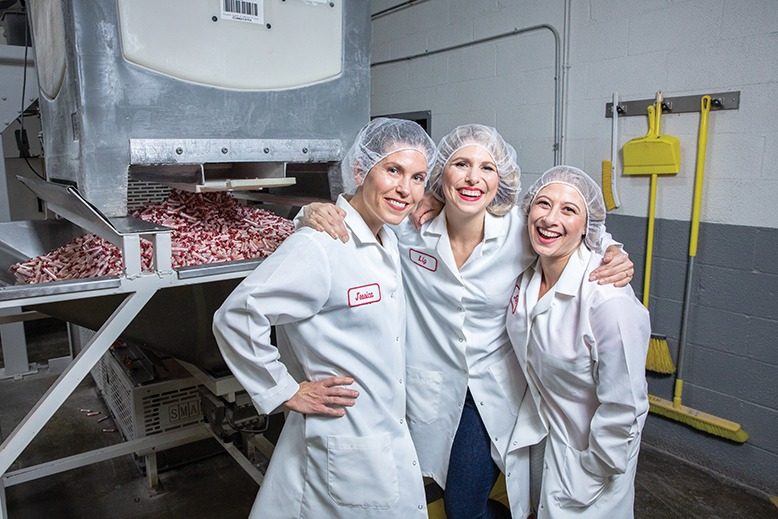
When Liz Dee was a kid growing up in New Jersey, her home was well known to local trick-or-treaters as “the Smarties house.”
“People knew we didn’t limit,” she says. “Instead of one or two pieces of candy, we’d give out a whole bag of Smarties.”
That’s because Dee’s grandfather, Edward Dee, invented the classic, pastel-colored, pressed-dextrose tablets, twist-wrapped in cellophane, which have been a Halloween favorite for generations.
Smarties is among several iconic candy brands that were born and bred in New Jersey. The most famous candy brand calling the Garden State home is arguably M&M’s, which made their debut in Newark exactly 80 years ago, in a factory at 285 Badger Avenue. In 1941, Forrest E. Mars Sr., son of Mars Company founder Frank C. Mars, patented his process to make the little chocolate discs covered in hard-candy shells. The first plain-chocolate M&M’s were sold to the U.S. Army as World War II military rations, allowing soldiers in tropical climates to carry chocolate that didn’t immediately melt.

The iconic M&M candies were created in Newark 80 years ago. Today, the Newark location is one of three Mars Wrigley factories that produce more than 400 million M&M’s per year. Courtesy of Mars Wrigley
In 1958, the M&M’s factory was moved to Hackettstown, where it remains today as one of three U.S. plants that produce more than 400 million M&M’s each year for Mars Wrigley, a Mars Inc. subsidiary. In 2020 Mars Inc. moved the North American Mars Wrigley headquarters from Chicago back to Newark, in the Ironside building on Edison Place.
“It’s extremely meaningful to have the North American HQ back in Newark, as that’s where we got our start and that’s where we plan to continue to grow,” says Sarah Long, chief marketing officer of Mars Wrigley North America. “As one of the world’s largest private, family-owned companies, it really is phenomenal to have such a strong connection to the great state of New Jersey.”

Edward Dee founded Smarties in 1949. Courtesy of Smarties Candy
Smarties, on the other hand, never left New Jersey. The company dates to 1949, when third-generation candy-maker Edward Dee traveled by ship to America from South Hampton, England, with his wife, Anita, and son, Jonathan. Arriving initially in Manhattan, they moved immediately to Elizabeth, New Jersey, rented a garage in Bloomfield and, armed with a repurposed pellet-making machine and a wrapping machine, began cranking out Smarties.
Jonathan, Liz’s uncle, eventually helped run the Smarties company, which, since 1967, has been located in Union. More than 70 employees continue to churn out over a billion rolls of the tart treats every year. Today, Liz Dee serves as copresident of the Smarties Candy Company, along with her cousin Sarah Dee and sister Jessica Sawyer—making it one of New Jersey’s longest running family businesses.
Not every beloved candy brand has maintained its longtime links to New Jersey. In 1938, Tootsie Roll, which had previously been manufactured in Manhattan, began production at a much-larger Hoboken factory, in buildings that occupied the entire block from 15th to 16th streets at 1515 Willow Avenue. By 1965, however, Tootsie Roll Industries opened a new factory in Chicago and closed its New Jersey doors.
But memories of Tootsie Roll’s ties to Hoboken haven’t disappeared. “Kids used to walk by the factory, and their parents, who worked there, would often stand on the fire escape and throw down hot Tootsie Rolls that were not packaged or pre-cut,” says Bob Foster, director of the Hoboken Historical Museum, which in 2011 displayed Tootsie Roll and other memorabilia in a special exhibit called “A Sweet History of Hoboken.”
There’s far more to New Jersey’s candy history than three famous brands, however. Red candy apples, for instance, are said to have been invented in 1908 by William Kolb, a Newark-based candy maker. But there is far more evidence about the origins of saltwater taffy, which famously got its start in Atlantic City in the 1880s. Joseph Fralinger popularized the confection, while competitor Enoch James is credited with mechanizing the process, making it less sticky and cutting the candy into bite-sized pieces.
Both Fralinger and James Taffy are now owned and operated by Atlantic City’s James Candy, a company run by the Glaser family since after World War II. In 2018, James Candy filed for bankruptcy protection after Boardwalk sales declined, though the company has publicly maintained that the filing would help it bounce back.
More recent sweet successes have come from PIM Brands Inc., known for Welch’s Fruit Snacks, Sour Jacks and Sun-Maid Chocolate Raisins. The company, founded in 1979 by president and CEO Michael G. Rosenberg, recently moved its global headquarters from Allendale to a sprawling complex in Park Ridge that was the former home of the Hertz Corporation. The complex underwent a nearly $30 million expansion and renovation last year.

Courtesy of Smarties Candy
How did New Jersey become such a hotbed of sweet treats? There’s no one answer, say candy historians, but many tasty possibilities.
For one thing, New Jersey’s location between many large East Coast cities made it an important hub in the late 19th and early 20th centuries, says Beth Kimmerle, author of four books, including Candy, the Sweet History (Collectors Press, 2003), that document the history of America’s confectionery industry. “New Jersey was the superhighway for north and south, near rail lines and waterways,” she explains. “It just made sense logistically.”
New Jersey’s proximity to Hershey, Pennsylvania, was a particularly useful connection. In the early 20th century, Hershey wasn’t only a manufacturer of chocolate bars for consumers, but an ingredient company, selling sugar (from its own Cuban plantations and mills), cocoa and other commodities to manufacturers and retailers.
While it might seem odd to imagine Hershey selling to Mars, one of its biggest competitors, it was actually a common practice for candy manufacturers at the time, says Jason Liebig, founder of CollectingCandy.com and one of the country’s premier candy-memorabilia collectors and historians. “I equate it to Samsung making the screens for the iPhone,” he says. There were also longtime links between the two confectionery giants. After all, Liebig points out, the two ‘Ms’ in M&M’s were taken from Forrest E. Mars Sr. and Bruce Murrie, son of Hershey Chocolate’s president, William F.R. Murrie, who had a 20 percent stake in the product. “The two companies were constantly intertwining; it was very incestuous,” he says.
[RELATED: 29 Moments That Shaped New Jersey]
Companies eyeing New Jersey were also often looking for more space than they could get in New York City, as well as a less expensive workforce. Tootsie Roll, for example, made a special outreach to the city of Hoboken, which had a large Latino population. “They even advertised in Puerto Rican newspapers, offering guaranteed jobs and housing vouchers,” says Foster.
Today, New Jersey remains a desirable place to run a business, says Mars’s Long, citing the state’s strong schools and network of top companies. “It’s a great state for us to recruit top talent,” she says.
However, there remain plenty of challenges for New Jersey candy businesses, especially after an unprecedented pandemic year. Not all companies weathered the storm. In a case of bitter timing, IT’SUGAR, a candy department-store chain, opened inside the American Dream mall in East Rutherford in December 2019. The company, with 100 stores in 28 states, filed for bankruptcy protection in September 2020. (It was poised to complete a reorganization process and reemerge in July 2021.)
But New Jersey’s top candy companies are no strangers to tough times, says Kimmerle. “They were founded and are run by people who have grown these businesses through thick and thin,” she says. Even a company as big as Mars, she adds, went through depressions and wars, when selections ebbed and flowed because sugar and other ingredients were rationed or unavailable. “It’s really a lens through which you can look at U.S. history,” she says.
***
As sales of Smarties have rebounded, Liz Dee says she expects high demand for the company’s iconic candy rolls this Halloween. Sadly, however, Edward Dee won’t be coming into the office as he always did. Liz’s grandfather passed away in November 2019, at the age of 95.
“He loved his work so much, he even came to work to check sales numbers on the day he passed away,” says Dee. “He was a brilliant man who lived in Elizabeth for the rest of his life and changed the course of New Jersey candy history.”
And, she emphasizes, though it has been courted by larger brands, the company is firmly committed to keeping Smarties in the Garden State.
“I have this unique opportunity to carry the torch for my family, for candy, and for New Jersey,” says Dee. “Smarties is not for sale. I am a fifth-generation candy maker here in New Jersey, and it is an honor and legacy to be able to continue.”
Sharon Goldman is a Metuchen-based freelance writer who, by order of her dentist, no longer keeps a candy stash in her kitchen cabinet, but sometimes dreams of saltwater taffy and chocolate-covered caramels.
